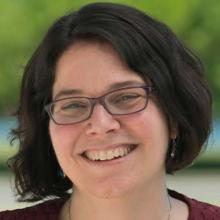Member Since 2015
Bryan Balvaneda is an advanced doctoral candidate at the University of Massachusetts Boston in Boston, MA. He is interested in studying the interpersonal context of clinical processes and providing alternative mental health service delivery models for reaching underserved populations. Bryan Balvaneda es un estudiante avanzado de psicología clínica en la Universidad de Massachusetts Boston. Bryan se identifica como un hombre Latino, y está dedicado a servir a la comunidad Latina con servicios en Español, así como trabajando con otras comunidades desventajadas.
Bryan and ADAA
"I was introduced to ADAA upon entering graduate school through the suggestion of my advisor, Sarah Hayes-Skelton. She described ADAA as having a more intimate, connected community of professionals and pre-professionals, and that the conference often provided more opportunities for integrating research into clinical practice. These two factors sounded like a great fit for my career goals, and I have felt that ADAA would be a great professional home for me since my first conference in 2015 .
As an ADAA member, I've enjoyed the intimate network of community members that allows me to easily connect to others and become aware of opportunities. Often, ADAA members and leadership have presented me with opportunities to become involved with ADAA initiatives that align with my interests and career goals, without me even needing to reach out!
I have always returned from an ADAA conference with clear ideas and skills for improving my clinical practice, and as a trainee that has been always invaluable. Moving beyond my formal graduate training, I foresee these opportunities to improve my practice continuing given the great work I have consistently seen from ADAA members. In addition, the opportunities to frequently and easily communicate with and interact with ADAA leadership has enabled me to visualize a role in organizational leadership that I had not imagined before.
Recently I was awarded the Distinguished Student Practice Award by APA Division 12 and it has been a great honor to be recognized for my work in outreach and supporting underserved communities. I also matched for internship at the University of California, Riverside and am excited to return to an area I call home and serve my community!"
Lorraine U. Alire is a multiracial, Asian American and Latinx, fifth-year doctoral student in clinical psychology at the University of Massachusetts, Boston. She is co-mentored by Dr. Sarah Hayes-Skelton and Dr. Karen L. Suyemoto. Her clinical and research interests lie in the development and dissemination of racially and ethnoculturally responsive, evidence-based interventions for People of Color, particularly Asian Americans and Latinx immigrant communities, suffering from anxiety-related disorders in the context of systemic racism and oppression.
Alison Chavez is a doctoral candidate in clinical psychology at the University of Massachusetts Boston. Her research interests center around infant mental health, family functioning, and addressing service disparities for children and families from underserved communities.
Mayte Forte is an advanced doctoral candidate at the University of Massachusetts Boston. Her research and clinical focus include cultural and linguistic adaptations of cognitive assessments and culturally responsive adaptations of evidenced-based treatments.
Dr. Lizabeth Roemer is Professor in the Department of Psychology at University of Massachusetts Boston, where she is actively involved in research and clinical training of doctoral students in clinical psychology. Dr. Roemer has published over 150 journal articles and book chapters and coauthored four books. With Dr. Susan Orsillo, Dr. Roemer has developed an acceptance-based behavioral therapy for generalized anxiety disorder. They have examined this treatment in studies funded by the National Institute of Mental Health. Their self-help book, The Mindful Way through Anxiety: Break Free from Chronic Worry and Reclaim Your Life, and self-help workbook, Worry Less, Live More: The Mindful Way Through Anxiety Workbook, draw from their decades of research in this area to provide guidance to people struggling with anxiety. With her doctoral students and colleagues, Dr. Roemer also studies how mindfulness and values-based living can help people to thrive in the face of racism-related stress. She shares strategies for living a values-based life at Mindfully Doing What Matters.
As many in the United States (US) stay home and practice social distancing to protect themselves from COVID-19, individuals from lower socioeconomic status (SES) backgrounds face heightened barriers and risks. For example, school closures—while preventing the spread of the virus—have required caregivers to consider childcare, which can be costly, and have limited access to regular breakfast and lunch meals. In addition, many individuals from lower SES backgrounds do not have the opportunity to engage in remote work, placing themselves and those in their homes at greater risk for illness, costly medical visits, and heightened anxiety and fear of contracting the virus.
The spread of the virus in US cities has disproportionately impacted low-income communities, deepening already existing inequalities. As SES intersects with areas such as race, citizenship, incarcerated (or formerly so), disability status, and LGBTQ+ identity, it is important to consider the risks these populations face. For example, for undocumented individuals, there is an additional fear of engaging with public support systems due to the current US practices around deportation. The intersection of belonging to a low SES income bracket and another identity can lead to and/or exacerbate feelings of loss, grief, and traumatic response. Consequently, these individuals experience higher levels of psychological distress.
During the COVID-19 pandemic, low SES individuals have been affected by the lack of receiving timely, accurate, and consistent information about the course of the virus and the evolution of public health prevention measures. Low SES individuals often experience lower levels of health literacy and face barriers to access up-to-date information regarding disease prevention. The long-term impacts of this pandemic will continue to impact low SES people economically and may shape the future of children growing up in these households.
Coping Tips for Those Impacted
If you or others you know have been or are currently financially impacted by COVID-19, here are tips for coping with your emotions and the situation:
What can I do? Accept what you actually can and cannot control
-
- Continue to acknowledge your thoughts and feelings. Often times, it can be helpful to take a break, and seek out emotional support from others.
- Remember, it is ok to not always be strong and resilient. Have compassion for yourself at times when you are not feeling your best.
- Recognize the resources you and your family already have access to or need, including government aid, food, medications, a savings account, and/or shared community resources. Search your area for mutual aid and organizations that may help you meet your needs.
- Develop a daily routine that is structured yet allows flexibility. Try to accept that this routine is fluid and may change given the uncertainty of this moment and time.
- Reflect on helpful and unhelpful ways of managing financial stressors
How can my efforts to thrive remain sustainable? Take good care of yourself and loved ones.
Why is this happening, and why is it hard for me to manage? Uncertainty and transitional periods are stressful for all!
Ways to Support Low SES Individuals
One way of addressing the disproportionate impact of COVID-19 on low-income communities at the local, community, and policy levels is through allyship and advocacy. If you identify as economically stable, here are some ways to financially and socially support those with lower SES:
- Limit the amount of goods and resources you purchase and consider sharing with your community.
- If you are able to work remotely, offer extra support to those who cannot, such as offering to take care of individuals and animals and/or assist with chores.
Most importantly, sustain these supportive actions when the pandemic impacts lessen and remember we are all in this together!
Member Since 2015
Bryan Balvaneda is an advanced doctoral candidate at the University of Massachusetts Boston in Boston, MA. He is interested in studying the interpersonal context of clinical processes and providing alternative mental health service delivery models for reaching underserved populations. Bryan Balvaneda es un estudiante avanzado de psicología clínica en la Universidad de Massachusetts Boston. Bryan se identifica como un hombre Latino, y está dedicado a servir a la comunidad Latina con servicios en Español, así como trabajando con otras comunidades desventajadas.
Bryan and ADAA
"I was introduced to ADAA upon entering graduate school through the suggestion of my advisor, Sarah Hayes-Skelton. She described ADAA as having a more intimate, connected community of professionals and pre-professionals, and that the conference often provided more opportunities for integrating research into clinical practice. These two factors sounded like a great fit for my career goals, and I have felt that ADAA would be a great professional home for me since my first conference in 2015 .
As an ADAA member, I've enjoyed the intimate network of community members that allows me to easily connect to others and become aware of opportunities. Often, ADAA members and leadership have presented me with opportunities to become involved with ADAA initiatives that align with my interests and career goals, without me even needing to reach out!
I have always returned from an ADAA conference with clear ideas and skills for improving my clinical practice, and as a trainee that has been always invaluable. Moving beyond my formal graduate training, I foresee these opportunities to improve my practice continuing given the great work I have consistently seen from ADAA members. In addition, the opportunities to frequently and easily communicate with and interact with ADAA leadership has enabled me to visualize a role in organizational leadership that I had not imagined before.
Recently I was awarded the Distinguished Student Practice Award by APA Division 12 and it has been a great honor to be recognized for my work in outreach and supporting underserved communities. I also matched for internship at the University of California, Riverside and am excited to return to an area I call home and serve my community!"
Lorraine U. Alire is a multiracial, Asian American and Latinx, fifth-year doctoral student in clinical psychology at the University of Massachusetts, Boston. She is co-mentored by Dr. Sarah Hayes-Skelton and Dr. Karen L. Suyemoto. Her clinical and research interests lie in the development and dissemination of racially and ethnoculturally responsive, evidence-based interventions for People of Color, particularly Asian Americans and Latinx immigrant communities, suffering from anxiety-related disorders in the context of systemic racism and oppression.
Alison Chavez is a doctoral candidate in clinical psychology at the University of Massachusetts Boston. Her research interests center around infant mental health, family functioning, and addressing service disparities for children and families from underserved communities.
Mayte Forte is an advanced doctoral candidate at the University of Massachusetts Boston. Her research and clinical focus include cultural and linguistic adaptations of cognitive assessments and culturally responsive adaptations of evidenced-based treatments.
Dr. Lizabeth Roemer is Professor in the Department of Psychology at University of Massachusetts Boston, where she is actively involved in research and clinical training of doctoral students in clinical psychology. Dr. Roemer has published over 150 journal articles and book chapters and coauthored four books. With Dr. Susan Orsillo, Dr. Roemer has developed an acceptance-based behavioral therapy for generalized anxiety disorder. They have examined this treatment in studies funded by the National Institute of Mental Health. Their self-help book, The Mindful Way through Anxiety: Break Free from Chronic Worry and Reclaim Your Life, and self-help workbook, Worry Less, Live More: The Mindful Way Through Anxiety Workbook, draw from their decades of research in this area to provide guidance to people struggling with anxiety. With her doctoral students and colleagues, Dr. Roemer also studies how mindfulness and values-based living can help people to thrive in the face of racism-related stress. She shares strategies for living a values-based life at Mindfully Doing What Matters.

















